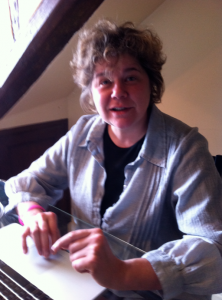Fabienne Der Hagopian lived in the United States for many years before moving back to her native France, where she now works as an independent online marketing specialist.
Being of Armenian descent, she has translated to French many posts about the Caucasus for Global Voices en français [fr], written by our Caucasus editor Onnik Krikorian, but she is also passionate about the world at large. She recently moved from Paris to the Normandy countryside near Honfleur – equipped with broadband!
Today, Fabienne reflects on her experience as a volunteer translator for Global Voices…

Fabienne Der Hagopian in France
Fabienne Der Hagopian (FDH): I discovered Global Voices about a year and a half ago. I can not remember how I came across it, but I was immediately fascinated for several reasons. First, I love the Internet because it's an incredible wealth of information giving (almost) everyone a medium to express themselves and Global Voices Online is one perfect illustration. It's an incredible source of views from people who “live” news, and even create them. And these are not stories reported by journalists: they are direct testimonies.
As a French woman of Armenian descent, it's a fantastic source on life in Armenia as well, and the conflict with Azerbaijan, told by people who live there today.
Finally, it's a pleasure to work with this welcoming team, and it's very rewarding to help disseminate a litte all those people's voices.
Global Voices (GV): How close are you to your Armenian roots?
FDH: I actually know very little about Armenia today. My family on both sides, but separately, fled at the beginning of the genocide when family members began to “disappear”. They lived in Istanbul. My father's family fled to Lebanon, my mother's to France. My father later moved from Lebanon to France to study engineering and met my mother in an Armenian organization… They later discovered that their respective grandfathers, who both lived in Istanbul, knew each other and used to play chess together. Small world. My Armenian family is scattered in France, Lebanon, Sweden, some in the U.S. and Canada, but none actually lives in Armenia. That's why I always find very interesting to read what Global Voices Caucasus has to say about the situation there.
GV: Global Voices Caucasus has conducted a project attempting to establish online communication between Armenians and Azeris via a blog and a Facebook page. Do you think social media can play a part in conflict resolution?
FDH: Onnik Krikorian's project with Arzu, an azeri blogger, is the only one that I am aware of so far. The value of blogs rather lies in giving an opportunity to access information that is not controlled by authorities. In any conflict, there is a huge part of active disinformation: thanks to bloggers, readers have an opportunity to step back, to have other sources of information, to read testimonials and to think by themselves.
GV: For over a year now, you've translated blogs from the Middle East into French. These are now reputed to have played a part in the Arab uprisings. What are your feelings on that?
FDH: As in Armenia, social media is a new relay for information that bypasses authorities. It has become impossible (hopefully) to stop the flow of information. And it's a fantastic first step. When you think of the Armenian genocide and the Holocaust, the excuse was: “we did not know.” Today, it would be difficult to claim ignorance. But the rest of the world has to listen and react. Otherwise, mobile phones against guns won't go very far. That's where Global Voices plays a key role, by being a sounding board for bloggers from regions in the world that do not make it to the front page (and that goes well beyond the Arab revolutions). That's what is unique about the Global Voices: it highlights “normal” lives that are in fact not so normal.
 GV: How do you pick posts to translate into French, and, in fact, why did you chose to volunteer this way?
GV: How do you pick posts to translate into French, and, in fact, why did you chose to volunteer this way?
FDH : Since I left Paris to move in an old farm, deep in the Normandy countryside, I admit it's all too easy to forget about the rest of the world. To translate for Global Voices allows me to stay connected to what happens in the world, at a micro level, and to contribute a little to the information flow about what is happening in Uganda or Brazil. I love to translate posts on unlikely countries while watching the cows grazing in the meadow!







2 comments
Thanks for the shout out and thanks for the translations. However, just to say that there have been quite a few Armenian and Azerbaijani bloggers involved, all of which have been key to its success. Meanwhile, a few NGOs have taken the idea and since tried to duplicate it, usually after asking for the contacts I’ve made through social media when they couldn’t or didn’t, although in my opinion they’ve not been effective for a variety of reasons, but pretty much linked to Mary Joyce’s comments quoted on Ethan Zuckerman’s blog recently about originality being key as well as the need to devise new strategies as the situation changes.
Also interestingly, if it started on blogs, it then moved to Facebook, and now interestingly enough Twitter seems to have taken over. Regardless, the project which is now being undertaken with another Global Voices author continues to innovate and set the standards for others to follow. Anyway, thanks a lot for all your hard work. Even if other smaller scale projects have cost hundreds of thousands of dollars to implement, this has cost absolutely nothing thus demonstrating the real power and potential of social media. Voluntary translation has also been key so it’s appreciated. Same goes for Lingua in general.
Incidentally, in addition to the GV Special coverage page, just to point out that the main project site exists at: http://www.oneworld.am/diversity/ although everything in this area started in June 2008 with my first reaching out to Azerbaijani bloggers when others thought it impossible: http://globalvoicesonline.org/2008/06/10/azerbaijan-blogs-barcamps-social-networks/
my thanks to Fabienne Der Hagopian. a retired diplomat, now in little place in Florida, USA, I, like her, love to read news from real people around the world, often places I’ve served, as I look out to see an old Florida view.